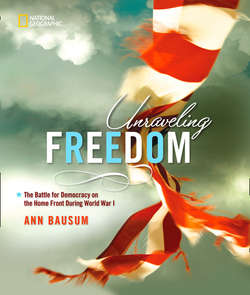Читать книгу Unraveling Freedom: The Battle for Democracy on the Homefront During World War I - Ann Bausum, Ann Bausum - Страница 9
Оглавление“We shall fight for the things which we have always carried nearest to our hearts [until we] make the world itself at last free.”
WOODROW WILSON, CONCLUDING REMARKS FROM HIS WAR MESSAGE TO CONGRESS, APRIL 2, 1917
INTRODUCTION
IN THE SPRING OF 1917, as the United States prepared to declare war on Germany and enter the fight that would become known as World War I, perhaps as many as a quarter of all Americans had either been born in Germany or had descended from Germans. My grandfather was one of them. But Frederic William Bausum and his family could be considered some of the lucky German-Americans on the eve of war. They spoke English and had no divided loyalty to an old-world country. They had grown up in the United States, married across ethnic lines, homesteaded on the Western plains, and embraced the customs and beliefs of the country. They had, in short, become Americanized.
Thousands of other German-Americans were less fortunate. Almost overnight, the language they spoke by birth, the relatives they retained ties to from their past, the books they read, the schools they attended, even the food and drink they found most familiar and enjoyable, all became associated with the enemy: Germany.
Immigrants and descendants from other places bore ties to competing nations, too, from Great Britain to France to Italy to Russia. U.S. residents who shared backgrounds and beliefs with these countries found themselves taking sides in the conflict at home even as President Woodrow Wilson tried to steer the United States away from joining the conflict abroad. Finally, on April 2, 1917, the President addressed Congress and made a dramatic appeal for the nation to enter the fight. In words that continue to be quoted for their eloquence and passion, Wilson asserted that “the world must be made safe for democracy.”
Yet, in one of the greatest ironies of 20th century U.S. history, the President so committed to securing democracy and freedom abroad failed to prevent the unraveling of freedom in his own country. Even as millions of Americans put on military uniforms and as the nation expended billions of dollars to fund the fight, freedom came under siege in the United States.
Dogs in the fight. Even though the United States remained neutral after fighting broke out in Europe in 1914, Americans followed the conflict between the continent’s leading nations with concern. Dogs became symbols for competing countries, with dachshunds representing Germany. The American bull terrier personified a confident and fearless stand by the United States.
New laws tested the rights of individuals to question and criticize the government. Leaders who spoke from the edges of the political spectrum found themselves ridiculed, harassed, even jailed. A government-sponsored propaganda effort built public support for the war by fanning anti-immigrant feelings within the nation. At a time when Americans fought abroad in the name of freedom and democracy, Americans at home burned German-language books, put German-language newspapers out of business, condemned German foods and drinks, and spied on fellow citizens, especially those with ancestral ties to Germany.
Some of these wrongs took decades to right. Others forever altered the nature of American life—from the nation’s commitment to teaching foreign languages to its tolerance of differences in people from foreign lands. What happens when a segment of the population can be charged with disloyalty simply because of its heritage? Why may democracy go off track when national security seems at risk? How can a nation of immigrants, whose strength comes in part from its diversity, survive the internal conflicts that follow when wars develop with old homelands?
One needs only to look back at history to find questions—and answers—that echo from the past into events of modern times.
